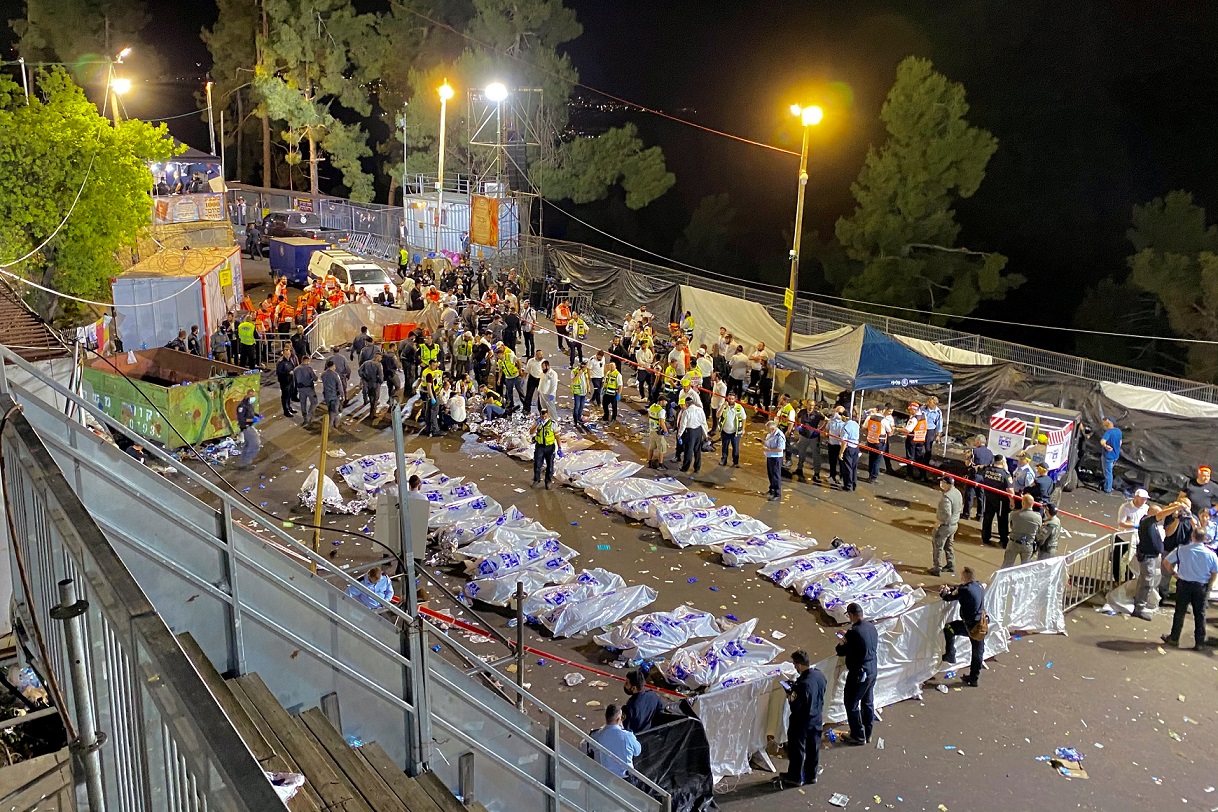Publications
INSS Insight No. 1463, May 10, 2021
The disaster on Mount Meron on April 29-30, 2021 is evidence of the systemic and ongoing crisis that besets the State of Israel, manifested in flawed governance and based on insufficient legal norms that can serve as a general, equal, and binding framework for state, public, and private conduct. In order to turn the dire and unnecessary disaster into an opportunity, Israel must identify and redefine, in a professional and independent manner, the systemic, social, and political roots that facilitated the underlying circumstances of this incident, as well as those that stood behind the flawed management of the Covid crisis. This is essential in order to bring about the required structural change that will enable a successful response to future civil and security threats.
The disaster on Mount Meron on April 29-20, 2021, which killed 45 victims, is yet another reflection of the ongoing systemic crisis that besets the State of Israel. This profound crisis is manifested mainly in flawed governance and insufficient legal norms that can serve as a general, equal, and binding framework for the conduct of the state, the public, and the citizens of Israel. The inquiry of the disaster, which is necessary for the purpose of drawing systemic lessons and their implementation, must not be limited to the specific circumstances, which are significant in and of themselves, but should be explored from a holistic national perspective. Otherwise, at best, any amendments will be vague and pinpointed, and the systemic failure will remain intact, awaiting the next disaster.
This multi-casualty incident must be treated as a mass disaster. Mass disaster management is a distinct professional discipline, based on rich international experience and academic research. Indeed, there is widespread agreement on some main principles in this framework, such as: the need for meticulous advance preparation on the state and local levels, according to relevant scenarios and the unique characteristics of the country in question; the need for clear division of responsibility and accountability for disaster management across the governmental hierarchy; the need for detailed and binding legislation on this matter; the need for collaborative efforts to ensure multidimensional recovery from the disaster; and the need to examine the whole spectrum of disaster management in the integrative perspective of an all hazards approach.
The problem in Israel, based on the experience of security disruptions on the civilian home front, is that these principles, which are accepted by the Israeli establishment at the theoretical and declarative level, are not applied satisfactorily in practice. This was evident this past year, when the government management of the Covid-19 crisis was flawed and consequently contributed to the large number of fatalities (735 deaths per million people, ranked 155 out of 219 countries), despite the success of the vaccination campaign. This governance issue corresponds with the all hazards approach, which suggests building preparedness for mass disasters not according to their origin and nature (natural disasters or man-made disasters), but according to the known characteristics of the arena and the systems expected to be damaged by the disruption. In order to follow these guidelines, Israel not only has to correct local flaws, but must focus on the broader spectrum that should enable the comprehensive restructuring of the entire integrated system that deals with mass disasters.

Such a systemic restructuring in Israel should be based on two parallel interdependent domains:
At the socio-political level, the diverse heterogeneous nature of the Israeli social fabric is well-known. From here stems the expanding phenomenon of social "enclaves," such as the ultra-Orthodox, Arab, and other publics, which are commonly isolated and alienated from the other groups, as well as from the state and its institutions. Their conduct is often shaped by tendencies to ignore state authority, to address the state and its agencies, such as the law enforcement bodies, with demonstrable antagonism, and to act in many ways according to their respective sectorial cultural imperatives. Most of their loyalty is to their group and their leadership, which influences their choices as to when and how to accept the authority of the government and the rulings of the legal and enforcement mechanisms. This is true in time of routine, but it becomes particularly problematic in times of peril.
These phenomena challenge not only the other sectors, but also the general public, the state, and its institutions, even when it aspires to act in an egalitarian manner. The problem is exacerbated when such groups have a sectorial political representation, acquiring local and state power positions. This is the case especially during an ongoing political crisis, which intensifies the issues of solidarity and trust. This complex picture, which is becoming increasingly troubling, creates a considerable challenge to Israeli governance.
At the state level: the governance challenge in Israel and its causes constitute another major obstacle to the required management of mass disasters, which in any event is a demanding challenge. The primary expression of this obstacle is in the politicization of decision making, both at the top level and concerning personal issues. The existing link between the social "enclaves" and politicization at various levels of government creates considerable difficulty in managing routine life and especially mass disasters in a coherent, equal, and effective manner.

This is connected to the insufficient government awareness of the significance and impact of mass disasters. In Israel this is reflected mostly in the civilian sphere, but also in the security domain. Overall, Israel has not experienced a large number of civilian mass disasters with many casualties. Still, it could have been expected that due to the numerous and frequent security disruptions in the civilian midst (mostly during the second intifada, or in the face of frequent rocket attacks by Hezbollah and Hamas), Israel would be better prepared for security risks to the civilian front, but this is not sufficiently the case. Although there emerged a successful mode of response in the area bordering the Gaza Strip, it is not implemented in other vulnerable areas, along with previous government decisions that have not been implemented (for example, regarding the sheltering of northern localities).
Low awareness and limited interest in systemic engagement in the field of mass disaster management are also expressed in the field of legislation, which is supposed to specifically define the critical circles of responsibility and accountability. For years, the government and the Knesset have avoided legislation to regulate the management of emergencies (security or civilian). This is mainly due to the desire not to determine explicitly and in advance by legislation who are the responsible parties for the overall management of such events. In the absence of such legislation, the blurring of decision making processes from the senior political echelon to the local levels is evident, as is exemplified in the recent disaster.
The lack of legislation and regulations express and strengthen the culture of "depend on me," "it will be all right," and "with the help of God." All of these reflect the glorification of the improvisational capabilities that Israel is so proud of, and marginalize the necessary central role of professional planning, tight organization on the national and local government level, control, and supervision. Even if improvisation might be an important trait, it must be balanced by professionalism and enforcement.
Conclusion
In addition to the need to examine objectively and professionally what caused the disaster on Mount Meron, it is important to look ahead and see each disaster as an opening for opportunity and change. Correcting local deficiencies while investigating in detail what happened on Mount Meron, with all its importance, is not enough to prevent future disasters. A profound structural change is required both in Israeli society and government and in the interface between them. This should take place simultaneously on the basis of the lessons of the disaster on Mount Meron and the coronavirus crisis. The similarities between them reveal the deficiencies of the existing system and require novel thinking, long term planning, and careful decision making at the holistic level, based on an understanding and recognition of the need for profound structural change. Local solutions may improve local sectors and processes concerning specific disruptions, like the last occurrence. However, they will not be enough to bring about the emergence of an up-to-date, professional, planned, legislation-based, information and budget-based system that will structure a new equation in the relationship between the heterogeneous and fragmented Israeli society and the government.



